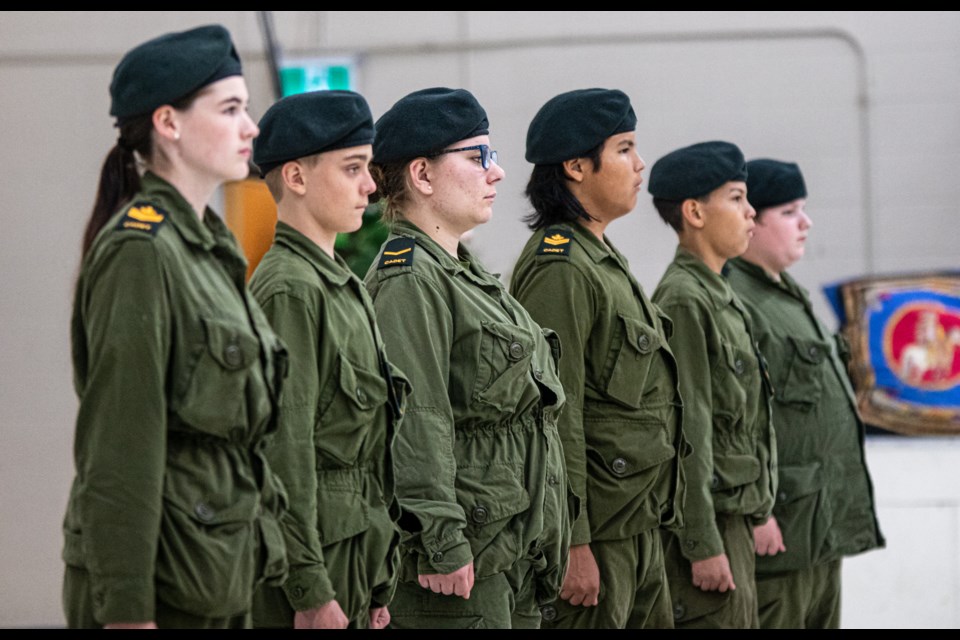ST. PAUL – The St. Paul Royal Canadian Army Cadets, or officially known as the 2395 Royal Canadian Army Cadet Corps (RCACC) Logistics, started this year’s first Logistics Parade night on Sept. 7 at the Mannawanis Native Friendship Centre.
The 2395 RCACC began in 2002, originally as an affiliate of 2995 RCACC Lac La Biche, until it became its own unit as the 2395 RCACC Logistics in Mallaig in 2003. The 2395 RCACC Logistics then moved to the Mannawanis Native Friendship Centre in St. Paul in 2017.
The Cadet Program is a national program for young people between the ages of 12 and 18, encouraging and teaching leadership skills, physical fitness, personal health and active citizenship, according to Sadie Hulme-Lawrence, the commanding officer for the St. Paul Army Cadets. Hulme-Lawrence is also an officer at the Royal Canadian Navy.
“Tonight is our first parade back for the new training year [2023-24],” which runs from September until the end of June next year. Registration for the program is now open.
Anyone interested in joining the cadets are welcome to attend the nightly parades every Thursday at 6:30 p.m. Youths can join the program at no cost.
The national program is funded through the Department of National Defense (DND), which helps provides materials, as well as supports Canadian Armed Forces (CAF) officers with training the cadets. DND also provides uniforms.
Other supports come from the community, such as the local Royal Canadian Legion, community sponsoring committees like the St. Paul Army Cadet’s parents’ committee, or fundraising efforts.
According to Hulme-Lawrence, cadets learn basic training through the program, including learning how to take care of a uniform, how to march, and responding to orders, particularly for those interested with joining the Canadian Armed Forces.
The cadets also take part in occasional training with other cadet units in the Lakeland, such as the Royal Canadian Sea Cadets, and the Royal Canadian Air Cadets, said Hulme-Lawrence. This training involves sports activities and exercises.
Even if the cadets may not choose to join the Canadian Armed Forces in the future, their time in the program is useful throughout their adulthood, said Hulme-Lawrence. The program teaches youths outdoor skills such as basic trekking and navigation, how to start a fire and keep it going, and how to find the best spot for a campsite.
Other activities by the Cadets include volunteering for community events, public speaking, and leadership training. “Nobody passes or fails here... you put in as much as you want to get out,” said Hulme-Lawrence.
There is also the social aspect of the program, said Hulme-Lawrence. “You make a lot friends [because] we do a lot of exercises with other units.”
“My own children were in the cadets [program,] they have friends across Canada and the United States,” she said. “You get to experience seeing our country by going to summer camps. Locally, you [also] get to find out all the good camping spots.”
Hulme-Lawrence said that the diversity of the cadets' program provides many opportunities and experiences for the cadets.
Joining is simple. Those interested can simply show up to one of the parades, watch what’s going on, and approach Hulme-Lawrence.
Eric Schwab, 16, is a warrant officer with the St. Paul Army Cadet, he said he hopes to join the Royal Canadian Army in the future and becoming a cadet was a good step in the right direction.
“It will help me out with my marching, and all my survival skills in the future.”
When asked what the most important aspects of being a cadet is, Schwab said it would be learning respect, team building, leadership, “and just having fun with other people.” Schwab has been a cadet for five years.
Angie Whiskeyjack, 17, is a senior cadet.
“I joined because I was kind of roped into it through my siblings,” she said, with a light laugh. “But that’s alright,” because those siblings are “great role models.”
Whiskeyjack added, “I want to be like that for the other younger cadets... and hope I can live up to that."
Since she joined five years ago, she found the team-building aspect and the leadership training to be among the most important parts of the cadet program.
Both cadets also encourage other youths to join, with Schwab noting the program is a lot of fun. Whiskeyjack nodded in agreement.
Most importantly, the cadet program teaches cadets important life values, according to both cadets. “Maybe you can rope your other friends into it too,” said Whiskeyjack, with a smile.



